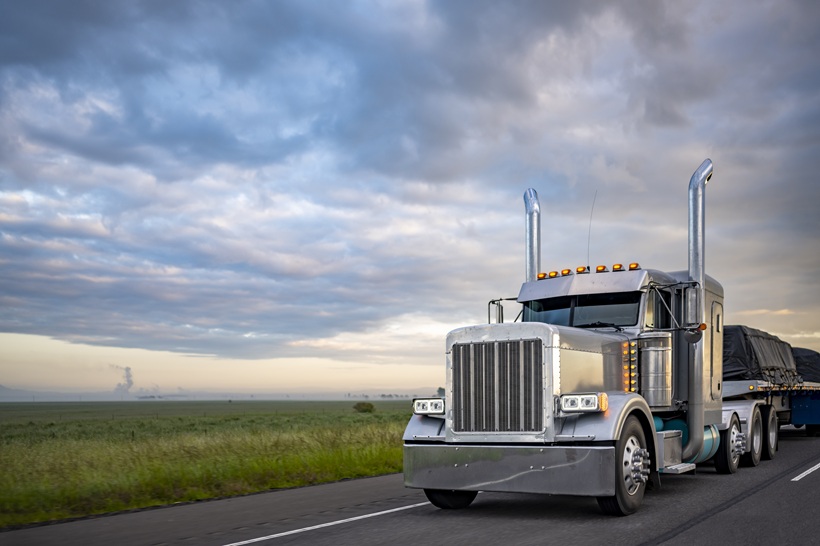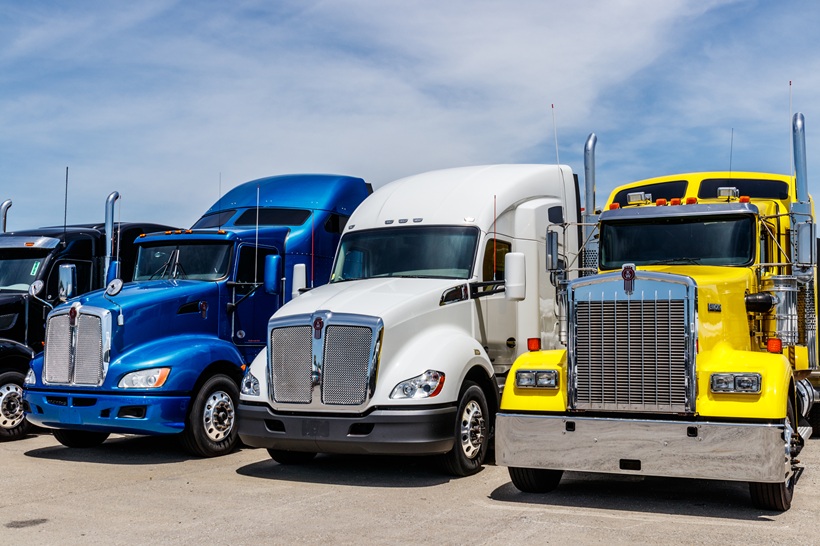
Celebrating Women Leaders at Transflo: International Women’s Day 2025
In the transportation and logistics industry, outstanding leadership drives innovation, resilience, and strategic growth. This is especially the case at Transflo, where this International Women’s Day, we’re spotlighting the exceptional women leaders who are helping shape Transflo’s vision and impact across the freight technology landscape.
We sat down with four of our outstanding vice presidents in various departments to discuss their passion for freight tech, strategies for supporting women entering the industry, career wisdom they’d share with their younger selves, and the critical skills needed for tomorrow’s leadership. Their insights reveal not only the dynamic nature of today’s transportation technology sector but also practical pathways for cultivating the next generation of innovative leaders.
Let’s hear from these transportation technology trailblazers who are driving Transflo and the industry forward:
- Marcia Wood, Senior Vice President of Accounting and Process Improvement
- Emily Stratton, Vice President of Customer Solutions
- Marissa Carey, Vice President of Customer Success
- Ally Spaventa, Vice President of People and Culture
Marcia Wood

Why do you love working in the freight tech space?
I have always been fascinated by the movement of products and the intricate logistics required to get those products into someone’s hands. Over the years, I have seen the demand for faster logistics grow exponentially, as people expect more rapid delivery and seamless experiences.
That is where freight tech comes in—it’s designed to reduce friction in the supply chain, enabling faster product delivery, the instant transfer of information and quicker payment to all involved parties, like our valuable truck drivers. Having worked in logistics since my teens, my career journey has been full of milestones, starting with scanning and indexing bills of lading onto microfiche.
Over time, as a CFO of a successful third-party logistics broker I became involved in EDI, API, and TMS implementations, and designed workflows that facilitated the electronic flow of freight paperwork nearly two decades ago. I have also had the privilege of serving on customer advisory panels, helping shape more efficient products and contributing to the future of freight invoicing through blockchain. To be able to help move products more efficiently, provide faster backend processes, and improve DSO have been the key drivers in my career. Being at the forefront of freight tech fascinates me and combining that with finance tech brings out the true nerd in me. Freight tech is constantly evolving, driving innovation to meet the growing demands of a faster, more connected world, and I am thankful to have been a part of that journey.
What are some ways you think our industry can support women who are interested in starting their careers in logistics or freight tech?
Providing mentorship and networking opportunities are crucial to help support women who are beginning or expanding their career in logistics or freight tech. Connecting women with experienced professionals in the field can provide guidance, advice, and opportunities for career growth.
Additionally, connecting with successful female role models in logistics and freight tech can inspire others. Lastly, it’s important that women are also connecting with successful male role models and building relationships with their male colleagues. Logistics is a relationship business, and it’s crucial to connect with people of all phases in the industry.
What advice would you give to your younger self as you were starting out?
I would tell my younger self to embrace every opportunity for growth, even if it feels uncomfortable at first. Don’t be afraid to ask questions or make mistakes because that’s how you learn and improve. It is okay not to know something; always be ready, though, to figure it out. Also, do not underestimate the power of building relationships with others; networking and collaboration are often just as important as technical skills. Most importantly, trust yourself and your abilities—confidence grows with experience.
What skills do you believe will be crucial for the next generation of leaders?
Adaptability is a crucial skill the next generation of leaders will need to thrive in a quickly changing atmosphere. Gone are the days of spending years concentrating on building a specific skill set because by the time you are an expert, the needs for those skills have changed. One must build your knowledge base and then be ready to learn more about the next technological change. In a sea of changing tech, it’s better to be a little johnboat instead of a yacht; be nimble.
Emotional intelligence is another key skill to maintain in your wheelhouse. Understanding different perspectives is key to successful relationship building and allows for more efficient and effective solving of issues that affect difference aspects in a team.
Additionally, a growth mindset—being open to learning and innovation—will help leaders stay ahead of the curve.
Emily Stratton

Why do you love working in the freight tech space?
I’m passionate about working in the freight tech space because it’s an exciting mix of technology and logistics—two ever-evolving fields. The thrill of tackling complex challenges and witnessing the real-world impact of our solutions is incredibly rewarding. Every day brings a new opportunity to innovate and make a difference.
What are some ways you think our industry can support women who are interested in starting their careers in logistics or freight tech?
To inspire more women to enter and thrive in logistics and freight tech, we need to ensure equal opportunities for growth and leadership. Organizing educational workshops that highlight women keynote speakers who excel in this field, along with networking events specifically for women, can equip the next generation of female leaders in our industry with good resources and meaningful connections.
What advice would you give to your younger self as you were starting out?
If I could pass along a piece of advice to my younger self, it would be to always embrace perseverance and curiosity. Stay open to learning from every experience, and don’t hesitate to ask questions or seek support when needed. Building a strong network of mentors and peers is invaluable. Most importantly, trust in your abilities and be bold in taking risks. The freight tech space is filled with opportunities for those willing to innovate and challenge the status quo.
What skills do you believe will be crucial for the next generation of leaders?
For the upcoming generation of leaders, adaptability and technical proficiency will be essential for success. As technology continues to transform logistics, knowing how to effectively leverage the right tools will be crucial. Additionally, a dedication to continuous learning will empower leaders to navigate challenges and seize the opportunities that arise in our ever-evolving industry.
Marissa Carey

Why do you love working in the freight tech space?
I love working in the freight tech space because it allows me to be part of something truly integral to society. Freight is the backbone of the economy, yet it’s an industry that has traditionally been slow to adapt to new technology. Being able to drive innovation in this space is incredibly rewarding. It’s exciting to see the tangible impact of technology in an industry that’s evolving rapidly, and I take pride in helping to shape that transformation.
What are some ways you think our industry can support women who are interested in starting their careers in logistics or freight tech?
Supporting women in logistics and freight tech starts with making sure they feel welcome and empowered. Networking and mentorship can go a long way in helping more women break into the industry, and companies need to create real opportunities for growth—things like leadership development, flexible work policies, and a culture that truly values what women bring to the table.
It’s also important to highlight the women already making an impact so they can inspire the next generation. At the end of the day, bringing in more diverse perspectives helps drive innovation and makes the industry stronger for everyone.
What advice would you give to your younger self as you were starting out?
I’d remind myself to quiet that imposter syndrome; you belong in the room, and your perspective is valuable. Confidence comes with experience, but believing in yourself from the start makes a huge difference. I’d also tell my younger self to prioritize networking—it’s crucial in building relationships, opening doors, and learning from others who have been in your shoes.
What skills do you believe will be crucial for the next generation of leaders?
The next generation of leaders will need to be adaptable, emotionally intelligent, and strong communicators. With AI transforming the way we work, leaders will need to stay ahead by embracing change and honing skills that make them more valuable than AI—like critical thinking, creativity, and human connection. The best leaders will be lifelong learners who know how to leverage technology while bringing the uniquely human skills that AI can’t replace.
Ally Spaventa

Why do you love working in the freight tech space?
Throughout my career I have worked in various industries, with freight tech being the most recent. I’ve really enjoyed the fast-paced nature of the tech space. It’s constantly evolving and always presents new learning opportunities, which keep me excited and engaged.
What are some ways you think our industry can support women who are interested in starting their careers in logistics or freight tech?
We should continue to showcase our female leaders and ensure their presence at conferences and recruiting events. Additionally, we can strengthen our partnerships with universities to promote internship and hiring opportunities to attract and support women entering the industry.
What advice would you give to your younger self as you were starting out?
You are your best advocate. Never hesitate to speak up and advocate for what you want and deserve.
What skills do you believe will be crucial for the next generation of leaders?
The world is evolving faster than ever, making adaptability and the ability to lead change essential. Equally important is having both emotional intelligence and self-awareness.



